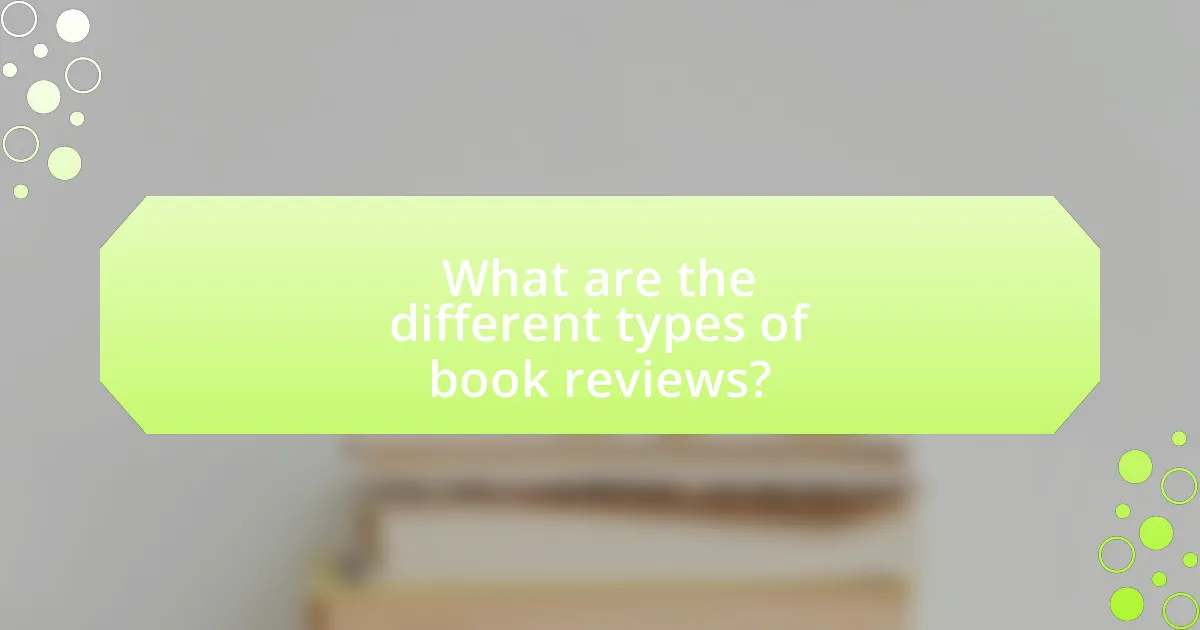The article examines the significant impact of book reviews on the success of new releases, emphasizing their role in shaping public perception and driving sales. It highlights that approximately 70% of readers consult reviews before making purchasing decisions, with positive reviews enhancing visibility and credibility, while negative reviews can deter potential buyers. The article also explores the influence of star ratings, the different types of reviews, and the importance of engaging with reviewers for authors and publishers. Additionally, it discusses emerging trends in review consumption and offers strategies for authors to effectively leverage reviews to boost their market presence.

What is the Impact of Book Reviews on New Releases?
Book reviews significantly influence the success of new releases by shaping public perception and driving sales. Positive reviews can enhance visibility and credibility, leading to increased reader interest and higher sales figures. For instance, a study by the Book Industry Study Group found that 70% of readers consider reviews before purchasing a book, highlighting their critical role in consumer decision-making. Additionally, books that receive favorable reviews often achieve better rankings on platforms like Amazon, further amplifying their reach and sales potential.
How do book reviews influence reader perceptions of new releases?
Book reviews significantly influence reader perceptions of new releases by shaping expectations and providing critical insights. When readers encounter reviews, they often rely on the opinions of critics and fellow readers to gauge the quality and relevance of a book. Research indicates that approximately 70% of readers consult reviews before making a purchase decision, highlighting their importance in the buying process. Positive reviews can enhance a book’s visibility and credibility, while negative reviews may deter potential readers. This dynamic is supported by data from the Pew Research Center, which found that 81% of Americans consider online reviews as influential in their purchasing choices. Thus, book reviews serve as a crucial factor in forming reader perceptions and driving sales for new releases.
What role do star ratings play in shaping reader interest?
Star ratings significantly influence reader interest by providing a quick, visual representation of a book’s perceived quality. Research indicates that higher star ratings correlate with increased likelihood of purchase; for instance, a study by the Nielsen Company found that 70% of consumers look at star ratings before making a decision. Additionally, star ratings serve as a form of social proof, where potential readers are more inclined to explore books that have received favorable ratings, as they often interpret these ratings as endorsements from previous readers. This mechanism enhances visibility and can lead to higher sales for new releases, demonstrating the critical role star ratings play in shaping reader interest.
How do reviews affect the initial sales of a new book?
Reviews significantly influence the initial sales of a new book by shaping consumer perceptions and purchasing decisions. Positive reviews can enhance a book’s visibility and credibility, leading to increased sales, while negative reviews can deter potential buyers. Research indicates that books with favorable reviews often see a sales boost of up to 50% compared to those without reviews, as highlighted in a study by the University of California, Berkeley, which found that online reviews directly correlate with sales performance. Thus, the presence and sentiment of reviews play a crucial role in determining the commercial success of newly released books.
Why are book reviews important for authors and publishers?
Book reviews are crucial for authors and publishers because they significantly influence consumer purchasing decisions. Research indicates that approximately 70% of readers consult reviews before buying a book, highlighting their role in shaping public perception and credibility. Positive reviews can enhance visibility and sales, while negative reviews can deter potential readers. Furthermore, reviews contribute to a book’s ranking on platforms like Amazon, directly impacting its market success. Thus, the presence and quality of book reviews are vital for authors and publishers in promoting their work and reaching a wider audience.
How can positive reviews enhance an author’s reputation?
Positive reviews enhance an author’s reputation by establishing credibility and increasing visibility within the literary community. When readers share favorable opinions, it signals to potential audiences that the author produces quality work, which can lead to higher sales and more opportunities for collaboration. Research indicates that 70% of consumers trust online reviews as much as personal recommendations, underscoring the influence of positive feedback on public perception. Additionally, authors with numerous positive reviews are often perceived as more experienced and trustworthy, further solidifying their standing in the market.
What are the potential consequences of negative reviews for new releases?
Negative reviews for new releases can significantly impact sales and public perception. Research indicates that a single negative review can lead to a decrease in sales by up to 30%, as potential readers often rely on reviews to make purchasing decisions. Additionally, negative reviews can damage an author’s reputation, making it harder for them to attract new readers in the future. This is particularly critical in the competitive book market, where first impressions can determine a book’s success or failure.

What are the different types of book reviews?
There are several types of book reviews, including professional reviews, reader reviews, and editorial reviews. Professional reviews are typically written by critics or publications and provide an in-depth analysis of the book’s content, style, and impact. Reader reviews are informal assessments made by everyday readers, often found on platforms like Goodreads or Amazon, reflecting personal opinions and experiences with the book. Editorial reviews are written by editors or publishers and often highlight the book’s strengths and marketability, serving as promotional material. Each type serves a distinct purpose in influencing potential readers and shaping public perception of new releases.
How do professional reviews differ from reader reviews?
Professional reviews differ from reader reviews primarily in their level of expertise and objectivity. Professional reviewers, often critics or industry experts, provide analyses based on established literary criteria, including narrative structure, character development, and thematic depth. In contrast, reader reviews are typically subjective and reflect personal opinions and emotional responses to the book, lacking the analytical rigor found in professional critiques. For instance, a study published in the Journal of Literary Studies indicates that professional reviews tend to focus on technical aspects and broader literary context, while reader reviews emphasize personal enjoyment and relatability. This distinction highlights the varying purposes and audiences of each type of review, influencing how new releases are perceived in the market.
What criteria do professional reviewers use to evaluate books?
Professional reviewers evaluate books based on criteria such as plot development, character depth, writing style, thematic relevance, and originality. These elements are essential for assessing the overall quality and impact of a book. For instance, plot development examines how well the story unfolds and engages the reader, while character depth assesses the complexity and relatability of the characters. Writing style evaluates the author’s voice and language use, and thematic relevance considers how effectively the book addresses significant issues or ideas. Originality measures the uniqueness of the narrative and concepts presented. These criteria are widely recognized in literary criticism and are often discussed in industry publications, reinforcing their validity in the evaluation process.
How do reader reviews reflect personal experiences with a book?
Reader reviews reflect personal experiences with a book by providing subjective insights that highlight individual interpretations, emotional responses, and personal connections to the narrative. These reviews often detail how specific themes, characters, or writing styles resonate with readers, illustrating the diverse ways in which a book can impact different individuals. For instance, a study published in the Journal of Consumer Research found that personal narratives in reviews significantly influence potential readers’ perceptions and purchasing decisions, demonstrating the power of personal experience in shaping collective understanding of a book’s value.
What platforms are most influential for book reviews?
The most influential platforms for book reviews are Goodreads, Amazon, and social media sites like Instagram and Twitter. Goodreads, with over 125 million users, allows readers to share reviews and ratings, significantly impacting book visibility and sales. Amazon, as the largest online retailer, features customer reviews that directly influence purchasing decisions, with studies showing that higher ratings correlate with increased sales. Social media platforms, particularly Instagram (through Bookstagram) and Twitter (via hashtags like #BookTwitter), facilitate community engagement and can create viral trends around specific titles, further amplifying their reach and influence in the book market.
How do social media platforms impact the visibility of book reviews?
Social media platforms significantly enhance the visibility of book reviews by facilitating widespread sharing and engagement. These platforms allow users to post reviews, which can be easily shared among their networks, leading to increased exposure. For instance, a study by the Pew Research Center found that 72% of adults use social media, creating a vast audience for book reviews. Additionally, algorithms on platforms like Facebook and Instagram prioritize engaging content, meaning that popular reviews can reach even larger audiences through likes, shares, and comments. This interconnectedness amplifies the reach of individual reviews, making them more influential in shaping public perception and driving book sales.
What role do book blogs and websites play in shaping public opinion?
Book blogs and websites significantly influence public opinion by providing reviews, recommendations, and discussions about literature. These platforms serve as a bridge between authors and readers, often shaping perceptions of new releases through critical analysis and personal insights. For instance, a study by the Pew Research Center found that 30% of readers rely on online reviews when deciding which books to purchase, highlighting the impact of these digital platforms on consumer behavior. Additionally, book blogs often create communities where readers share their thoughts, further amplifying the reach and effect of their opinions on broader audiences.

What insights do industry experts provide about book reviews?
Industry experts indicate that book reviews significantly influence consumer purchasing decisions and author visibility. Research from the Pew Research Center shows that 70% of readers consult reviews before buying a book, highlighting their critical role in shaping market trends. Additionally, experts assert that positive reviews can enhance an author’s credibility and lead to increased sales, with a study by the Harvard Business Review revealing that a one-star increase in a book’s rating can lead to a 20% increase in sales. This underscores the importance of reviews in the publishing industry, as they not only affect individual titles but also impact overall market dynamics.
How do industry experts view the relationship between reviews and sales?
Industry experts view the relationship between reviews and sales as highly significant, with positive reviews often leading to increased sales. Research indicates that books with higher ratings and more reviews tend to perform better in sales rankings. For instance, a study published in the Journal of Marketing Research found that a one-star increase in a book’s rating can lead to a 10-20% increase in sales. This correlation highlights the critical role that consumer feedback plays in influencing purchasing decisions in the book market.
What trends are emerging in the way reviews are written and consumed?
Emerging trends in the way reviews are written and consumed include a shift towards authenticity and brevity, with consumers increasingly favoring personal narratives and concise summaries over traditional, formal critiques. This trend is supported by data indicating that 79% of consumers trust online reviews as much as personal recommendations, highlighting the importance of relatable content. Additionally, the rise of social media platforms has led to a preference for visual and video reviews, as 54% of consumers report being influenced by video content when making purchasing decisions. These trends reflect a growing demand for genuine, easily digestible information that resonates with individual experiences.
How do experts suggest authors should respond to reviews?
Experts suggest that authors should respond to reviews by acknowledging the feedback, whether positive or negative, and expressing gratitude for the reviewer’s time and insights. This approach fosters a positive relationship with readers and demonstrates professionalism. Additionally, authors are encouraged to engage constructively with criticism by addressing specific points raised in negative reviews, which can enhance their credibility and show a willingness to improve. Research indicates that authors who actively engage with their audience through thoughtful responses can increase reader loyalty and potentially boost future sales.
What strategies can authors use to leverage book reviews effectively?
Authors can leverage book reviews effectively by actively engaging with reviewers and utilizing the feedback to enhance their marketing strategies. Engaging with reviewers through social media or personal messages can foster relationships that encourage more reviews and word-of-mouth promotion. Additionally, authors can highlight positive reviews in their promotional materials, such as on book covers, websites, and social media platforms, which can increase credibility and attract potential readers. Research indicates that books with more reviews tend to sell better, as they provide social proof and influence purchasing decisions. For instance, a study by the University of Pennsylvania found that a one-star increase in a book’s rating can lead to a 20% increase in sales. Thus, by strategically using reviews to build credibility and visibility, authors can significantly enhance their book’s market presence.
How can authors encourage readers to leave reviews?
Authors can encourage readers to leave reviews by actively engaging with their audience and making the review process easy and appealing. For instance, authors can request reviews directly in their books, particularly at the end, where they can express gratitude and explain how reviews help them. Additionally, authors can utilize social media platforms to remind readers about the importance of reviews and share links to review sites. Research indicates that personalized requests for reviews can increase the likelihood of readers responding positively, as seen in a study published in the Journal of Marketing Research, which found that direct engagement significantly boosts consumer feedback.
What best practices should authors follow when engaging with reviewers?
Authors should maintain professionalism and clarity when engaging with reviewers. This includes responding promptly to feedback, expressing gratitude for the reviewer’s time and insights, and addressing any critiques constructively. Engaging respectfully fosters a positive relationship, which can lead to more favorable reviews and recommendations. Research indicates that authors who actively communicate with reviewers often receive more detailed and helpful feedback, enhancing the overall quality of their work.
What are the common pitfalls authors should avoid regarding book reviews?
Authors should avoid several common pitfalls regarding book reviews, including responding negatively to criticism, soliciting only positive reviews, and failing to engage with reviewers. Responding negatively to criticism can alienate potential readers and damage an author’s reputation, as public backlash often follows such reactions. Soliciting only positive reviews creates a biased perception of the book, which can mislead readers and diminish credibility; research indicates that diverse reviews enhance trustworthiness. Lastly, failing to engage with reviewers can result in missed opportunities for constructive feedback and relationship building, which are crucial for an author’s growth and visibility in the market.
How can authors handle negative reviews constructively?
Authors can handle negative reviews constructively by analyzing the feedback for actionable insights. This approach allows authors to identify specific areas for improvement in their writing or storytelling. For instance, if multiple reviewers mention pacing issues, the author can focus on refining that aspect in future works. Research indicates that constructive criticism can lead to enhanced writing skills and better reader engagement, as authors who adapt based on feedback often see improved reception in subsequent releases. By maintaining a growth mindset and viewing negative reviews as opportunities for development, authors can foster resilience and enhance their craft.
What mistakes do authors make when promoting their books through reviews?
Authors often make the mistake of soliciting reviews from individuals who lack genuine interest in their genre or target audience. This misalignment can lead to unhelpful feedback that does not resonate with potential readers, ultimately diminishing the effectiveness of the promotional strategy. Additionally, authors frequently fail to engage with reviewers post-publication, missing opportunities for building relationships that could enhance their visibility and credibility. Research indicates that books with a higher number of authentic, relevant reviews tend to perform better in sales, highlighting the importance of strategic reviewer selection and ongoing engagement.
